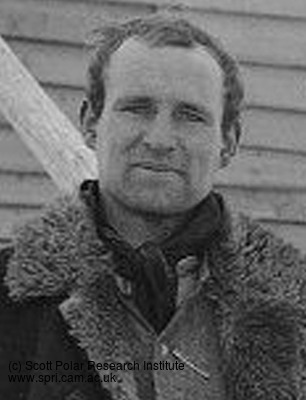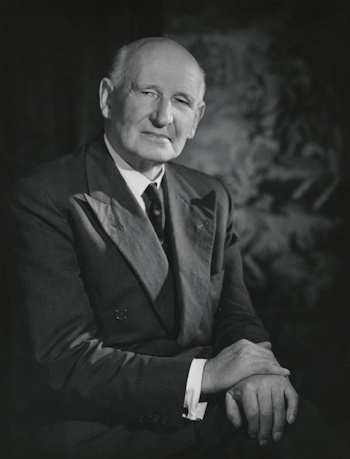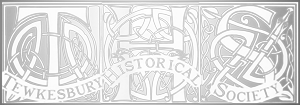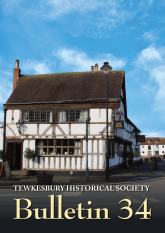Sir Raymond Priestley (1886-1974)
Early Days at Tewkesbury

My last meeting is vividly etched upon my mind. I was due to leave for University College, Bristol, the following week. I was sitting on one of a row of chairs along the wall at the Guild School eating a raspberry tart liberally endowed with jam and cream. In those days Willis’s tarts had plenty of both! My Mother beckoned to me from the other end of the room. I put the tart, out of which I had only taken one bite, down on my chair and went. As I left, I saw out of the corner of my eye a formidable old lady, of whom, in any case, I stood in considerable awe, and who was clad in her best black bombazine dress, sit down four-square upon my chair. I never looked back, sped past my Mother and out of the door and I never went back. To this day I have to rely on my memory of eyewitnesses’ accounts of what must have been one of Tewkesbury Methodism’s most notable scenes. Edward Seago would claim that, on that occasion, a masterpiece of what would today rank as contemporary art was painted in one magnificent splash!!!!
With the same Chapel are associated other memories equally good. I remember Theodore Bishop telling the tale of the Wesleyan Appeal for funds when a stingy pensioner who had offered 5/- was struck on the head by a piece of plaster from the balcony ceiling overhead and hastily changed his contribution to 10/- “Hit him again, Lord, hit him again” came from the pulpit in fervent tones. My Father, who sat at one end of a long family pew, flanked by a wife and eight children and with a row of boarders from the school in front, always claimed that he could listen better to the sermon with his eyes shut. He was a very keen cricketer and usually spent Saturday afternoon umpiring in School or Town matches.
One day he suddenly sprang to his feet in the middle of the preacher’s peroration, flung up his right arm and shouted, “How’s that?” at the top of his voice. Never, I am sure, has there been a greater sensation in Chapel or in Church.

As boys we had to go to Chapel twice a day on Sunday with Sunday school thrown in for good measure, while after tea my Mother played hymn tunes on the piano and we stood around and sang. Sermons in the decade from 1895 to 1905, in the Methodist Chapel were usually 45 minutes or thereabouts in length. The only book we were allowed to read during the sermon was the Book of Common Prayer in which were included Hymns Ancient and Modern. I learned a couple of dozen hymns off by heart. Years later, in the Antarctic, these mis-spent hours brought unexpected dividend. In 1912, the Northern Party of Scott’s Last Expedition lived out a winter in a snowdrift home in Terra Nova Bay. We desperately needed ways of marking the laggard flight of time. Each Sunday we held a Service largely from memory and a surprisingly successful effort it was. Campbell had brought along with him two books – Boccaccio’s Decameron and The New Testament. The latter formed the basis of our Sunday service. Abbott had been a chorister in York Cathedral in his boyhood and, with my help, managed to reconstruct most of the canticles in the Morning Prayer service, though, if we were not careful, we were inclined to go round in circles in the Te Deum.
I reconstructed, and taught to the others, bits and pieces of a dozen hymns. Most of them were short of a verse or two, but one “Hark! Hark! My Soul! Angelic songs are Swelling” which in the hymnbook has five verses, had six in our version. There is, after all, a certain sameness about hymns!
It was this same hymn that was the occasion of the only strike in which I took a prominent part. Nothing is more characteristic of the Navy than the fact that the content of Church Service is the prerogative of the Officer in Command. Victor Campbell was a first-class leader, but even he would not have claimed either that he had a good voice or that he was a good judge of the merits of a tune. “Hark! Hark! My Soul!” has at least two tunes, one of which the three men and I thought to be much better than the other. Victor had a different view. Week after week we had this hymn with what we thought to be the less inspiring tune. At last, Browning came to me and asked whether I could do anything about it. I thought the problem over and said that, if they would do what I suggested, next Sunday, I thought the plan might work.
Next week we all stood to attention and did not open our mouths during this particular item of the service. Levick had a voice like a corncrake and Victor, to say the least, needed support. The first verse of “Hark! Hark!” died prematurely and then, although it was the first hymn, we had the Benediction pronounced in a furious voice, which clearly meant something very different from what it said! Relations were strained for the better part of a week, but next Sunday the other tune produced an unprecedented burst of sound. All was well and so remained throughout the year.
“Lord it is good for us to be
High on the mountain here with
Thee Here in
the ample pure air
Above the stir of toil and care,
Where hearts oppressed with doubt and grief
Believing in their unbelief
Call on Thy Servants all in vain
To ease them of their bitter pain.”
I have sung this song in our snow-cave refuge at Hell’s Gate and in a camp 12,000 feet up on Mount Erebus. In both cases, it seemed to epitomise the isolation from the hurry and bustle of the modern world that was one of the better features of the old type of polar life before wireless telegraphy was invented. And I doubt if there is any modern amenity that adequately compensates for that sense of apartness that technology has inevitably taken away from the polar explorer of today.
September 1968. There is a postscript I should write to this. On my way home from one of my West Indian visits in the early sixties I came across a Wesleyan hymnbook in the small library of the Elders’ and Fyffe boat on which I was voyaging. I looked up this hymn and, to my amazement, found that this particular verse was not there! I cannot imagine that I invented the verse so that the version we had in Tewkesbury must have been a different one. R.E.P.When Prince Philip was in Australia with the Queen two years ago, he met Sir William Mitchell, the Chancellor of the University of Adelaide. On Britannia this evening I told him the story of how, during the first Congress of Australian Universities in Adelaide in February 1937, Mitchell was talking on University Administration. He was explaining at some length how democratic Adelaide University was! At that time he was Vice-Chancellor: he had married the daughter of the University’s chief benefactor and he had founded for his son, Mark, a Chair of Biochemistry! In the middle of his talk I wrote a note and passed it along the front row to the Master of one of the Melbourne University Colleges. To my dismay, old Willie stretched out his long arm and intercepted it. He opened it and read and a wide grin spread over his face. What I had written was – “Democracy be damned. Adelaide is a Despotism that has never needed to be tempered by Assassination.” (September 1968. Twenty two years later I passed through Adelaide again, when he was well over 90 years of age and he reminded me of this story among other things.)
It was at that Conference that the National Union of Australian Students was born, a creation for which my name must often have been cursed by my successors at Melbourne. We paid the expenses of a delegation of students from each Australian University. Parallel with ours they held their own Congress. They worked at least twice as hard as we did and, by the end of the week, the Constitution of the national body was complete down to the last detail. Chester Wilmot was, I believe, the leading spirit in this work, with Samuels his successor as President of the Students’ representative Council, a good second. (Britannia. R.E.P)
Watching deck hockey on Britannia I have been reminded of the similar game we used to play in the asphalt playground of the old Grammar School at Tewkesbury before its extent was restricted by the building of the new classrooms.
In those days the playground was a hundred yards long, of asphalt with rough brick walls. The old mulberry tree – mentioned in early editions of Mrs. Craik’s John Halifax Gentleman, was a natural obstacle. The goal at one end was a wire protected square bay window of the old Dining room; at the other end the space between two pillars giving access to the tan-floored gymnasium.
We played with bendy-sticks exactly like those used on Britannia, but with a tennis ball and we became incredibly clever at using walls for ricochets. It was the fastest game I have ever played and I remember one occasion when the four Priestley brothers, a Tewkesbury hockey match having been scratched through the floods, took on two internationals, a Western Counties and a County player and beat them something like 15 goals to one in half an hour. They could play hockey but they didn’t know how to bounce the ball off a given half-brick or the wooden supports that held up the old mulberry tree’s moribund limbs!
Part of our job in the summer holidays was to climb the mulberry tree and pick the fruit to make up full plates on which the fruits were symmetrically piled on large green mulberry leaves and taken round to parents of boys who attended school and to other prominent Tewkesbury citizens.
We were always picking, with the fruits, wasps that had, so to speak, had ‘one over the eight!’ So often was I stung that for years I was practically immune to the effect of Wasp poison! Indeed, even to this day, I fancy, they have less effect on me than they should. Climbing the mulberry tree was beautiful deep-blue clematis that made a glorious splodge of colour every summer and is one of my more vivid memories of the garden of my boyhood days.
Another of the games we played in the asphalt playground was dragging our sisters around on the short ladders we used for nipping over the walls to recover lost balls from our own garden and that of the Bell Hotel next door. At least we played until, one fateful day, I was doing an unusually fast sprint with my youngest sister Doris behind, literally ‘behind’, for she slipped down between the rungs and was badly scraped before I realised that her paeans of delight had degenerated into agonised shrieks. After that incident that particular recreation went into discard and, in those ‘Victorian’ days the reason for the interdict was only hinted at in hushed voices behind closed doors.
Much more noise was made about the more lethal occasion when, chasing a Painted Lady butterfly with a net in which I was carrying the poison floored killing-tin, I scored a bull’s eye on my brother Stanley’s head, conferring on him a crescent shaped scar which he retained to the end of his too short life. The fact that I also caught the butterfly was not even counted to my credit, least of all by the recipient of the dunt!
I, myself, thought it a jolly good shot!
My Father was, as I have said, a keen cricketer and one summer it cost him a good deal of cash. At the time, I think, I was 15 and my younger brothers and myself were all three in the School Eleven. Our pocket money at the time was the princely sum of 2d. a week which, for my part, was almost invariably expended on a two penny pork pie. As a ‘carrot’ that season my Father, in a rash moment, said he would give sixpence every time one of us scored 12 runs, a shilling for twenty and a penny for every run over. During the season it cost him well over £5. I scored 114 myself on one occasion. It was the Old Boys’ Match and my Father’s cronies were rolling about on the Pavilion steps, slapping each other on the back and gasping out “Another four pence gone Joe” as one ball followed another into the Swilgate Brook. Being a man of his word, he paid up but he never did it again. If he had it would have cost him very much more for my younger brother Donald lived to make a thousand runs in one season and to play for Gloucestershire before he, like Stanley, lost his life in the First World War.
My Father was a keen gardener too and round the old garden, running parallel with the playground, divided into flower and kitchen garden by rockery and yew hedge, and ending in stable and coach house, many poignant memories centre. We used to sneak over into the Bowling Green of the Bell Hotel next door which was out of bounds.
One of us ‘Kept Cave’ on the garden wall and one day Stanley, too intent upon our Mother’s unusually rapid approach, toppled from his vantage point into a pigwash barrel containing at least four (sic) deep of first-class mash for pigs. Never did pig squeal more or for better reason.
We could smell him for yards and, in memory, for days. Behind the yew hedge there was a Keswick Codling apple tree from which we were allowed one apple a day. It was always the one Father caught us eating and the real score topped the dozen many times! Along the wall there were three plum trees: a Victoria, a Greengage and a Coe’s Golden Drop. It was years before my Father learned why, one year, the plum crop failed completely. It was the year we were first given the little spring guns that fired tiny shot and the ground beneath the plum trees was for days covered with little heaps of dead bees. One day my Belgian hare got out and ate four score wallflowers Father had planted the day before. That took a lot of explaining too.
We were, not unnaturally nor infrequently, pressed into service as assistant gardeners and we were not always too well pleased. One day I was pretending to have difficulty in getting a heavy load of soil over the kerb of tiles that separated the path and lawn. Suddenly I was knocked out of the way by a hard clip on the ear. My Father seized the barrow handles, gave one tremendous heave, shouting, “Out of the way you idle boy!”, staggered several yards backwards across the lawn and sat down on the rockery hard. He gave a loud yell, sprang up, clapped one hand to his seat and hopped away inside. I was rolling on the lawn exhausted with laughter when my Mother came out and sent me for the Doctor. We did not see Father again for six weeks. He had sat down on a projecting rusty iron spike which had taken a large piece of trouser two inches into his rear. What with blood poisoning and shock it was a surprise that we ever saw him again. Bringing up a family of eight, even in ‘Victorian’ days, had its exciting side.
Garden and playground were both cut in half when the new school was built. The rooms were more comfortable it is true, but no longer was it possible to look out of a classroom window and see an ‘old boy’ catch a twenty pound pike on the old millpond into which, according to Mrs. Craik, Abel Fletcher had poured a sack of corn in dour defiance of a starving mob. However, the new Art Room, at least, was well adapted for recreation. Years later, when half the Shackleton Antarctic Expedition spent its holidays in Tewkesbury, we used to dance here according to a programme sketched on the blackboard by ‘Putty’ Marston, the expedition artist, who preferred pencil to dancing pumps. It only needed three or four families, any way, to make up a dance in Victorian days, when eights and sixes were the rule, following as quickly as might be after one another! I remember one winter when we skated all day and danced most of the night for a week and finished up singing Sea-Chanteys (sic) at three o’clock in the morning on the stairs of the Town Hall, to have a complaint from a neighbouring chemist who had been done out of his sleep promptly quashed because the Mayor, who was also the local Magistrate, was the host at the particular Ball.

She had never seen gold before. On some Saturdays of that summer of 1909 the Tewkesbury ‘A’ cricket team was practically made up of the Grammar School family and friends.
We roared through the countryside in a two-horsed brake singing songs Gloucestershire had never heard before as we squared yards, clewed up sails, pulled on halliards and stood out tacks and sheets, all in our memories and minds. We harried ‘Johnny Hall’ from his horrible crime to his still more horrid fate. We went ‘rolling home across the sea’: we went ‘a-roving with fair maids’ and bade fair Spanish maidens ‘Adieu’. And in between we slew, or were slain, by the local village teams. And a right good time was had by all and no harm done.
Today, Ernest Joyce, Frank Wild, and George Marston are dead; Bemard Day lies a cripple in Sydney, Australia; my Father, my Mother and my brothers have long passed on. Only I remain, living at Bredons Norton, to recall those stirring days: with, however, four sisters scattered about the world, two of them married to polar explorers of later vintage but of the same rare quality and kind.
What a weekend for Tewkesbury Grammar School was that when, besides these regulars, Ernest Shackleton himself arrived, and Edgewoth David of the keen blue eyes. That tea party my Mother never forgot and well she might remember it for no two greater polar planets were ever in conjunction under one roof! David, who tramped a thousand miles to and from the Magnetic Pole with a heavy sledge when over 50 years of age. Shackleton made the greatest advance towards either geographical pole that any leader of any nation ever made and brought his men unscathed through two great Expeditions. They were as different as chalk from cheese, but together they made a combination very hard to equal. Now the old school where they met – perhaps for the last time – is about to follow them into history, having done its little bit.
DECEMBER 1956. R.Y. BRITANNIA
SIR RAYMOND PRIESTLEY


Comments